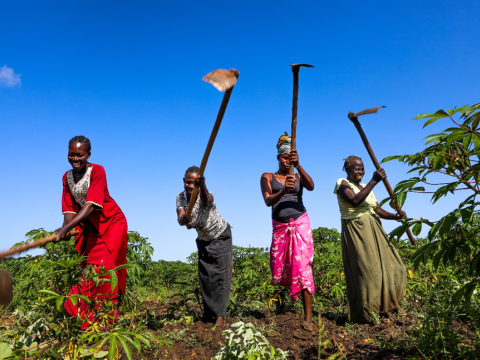Refugee families adopt block farming to improve food security

"I vividly recall when my children spent days without food. The teary eyes, weary faces and fading voices rendered me hopeless and restless. I could not bear the sight," says Joyce, a 31-year-old refugee mother of five.
"Fresh cassava leaves are all I had. I cooked and served it to my children as the meal," she says, wiping her eyes.
But out of despair and uncertainty, Joyce learnt one thing: the art of rationing the food to last for the longest time possible. She says, "When I received my family food rations from World Food Programme and World Vision, I had to calculate for every gram, ensuring it took us for at least 30 days, lest we would starve to death."

Despite meticulous calculations, Joyce could not live up to her art of living today with tomorrow in mind. The food rations continued reducing, condensing her intentions to a no-brainer. "It eventually became an exercise in futility. I could not plan anymore but surrender to fate to decide my course," she says.
Joyce is among 229,617 South Sudan refugees in Bidibidi Refugee Settlement. Before the global hunger crisis driven by conflict, climate change, the economic impacts of COVID-19, and rising food and fuel prices, every refugee household received 4.2kg of beans and 12 kg of maize per person as food rations for 30 days. The quotas have since reduced to 2.1kgs of beans and 8.82kg of maize per person, barely enough to keep a family of six like Joyce's afloat for a month.
Premised on this reality, World Vision, in collaboration with the World Food Programme and the Office of the Prime Minister, changed the strategy to ensure every family had affordable, healthy and nutritious food throughout the year.
Working through a partnership, they distributed 398 acres of land acquired from the host communities to more than 10,000 refugee families in Bidibidi and Lobule Refugee Settlements. Each family was allocated 30 by 30 metres of land to settle on and grow food.
"We continue raising concern on the urgent hunger crisis and working together to create a more sustainable future for all," says Cyril Acema, World Vision's Livelihoods Officer, Bidibidi Refugee Settlement in Yumbe district. "Now refugee families can grow their food to complement the food rations."
For Joyce, she started a small garden next to her house, where she grew vegetables to supplement her food. "My food gets done within 15 days, and I have to turn to my kitchen garden," she says, adding, "Before I resorted to begging my neighbours until the next distribution cycle."
As a refugee, Joyce never dreamed of owning land or renting a garden at US$40 per annum. But with the adoption of blocking farming, she has morphed from a chief beggar to a successful farmer.
So far, there are four block farms totalling 483 acreages of land. On average, there are 100 families on a single-block farm, with each household allocated about an acre of land for farming.
"I always wished to grow my food and take charge of how and when my family eats. This piece of land is exactly doing that. I am confident my family can't go hungry," says Joyce.

Like Joyce, the 56-year-old Ropani farms in the same garden. With over 10 children to feed, she was always constrained. But her story changed when she started block farming. She hopes to grow more food and sell the surplus to meet the school requirements for her children. "I did not go to school, but I will do everything to have all my children in school. I hope they will have a better future," says Ropani.
With refugee families working closely with the host community to produce more food, block farming could be the missing piece to secure bright futures for many vulnerable families in the fragile context.
"Already, many families are contacting us that they want to be part of the block farms, and we're working with partners to secure more farmland," says Acema.
Story and photos by: Brian Mungu Jakisa, Monitoring, Evaluation, Accountability and Learning Assistant, World Vision Uganda